Organizational Behavior Report: Culture, Power, Motivation
VerifiedAdded on 2021/02/19
|14
|3979
|48
Report
AI Summary
This report provides a comprehensive analysis of organizational behavior, focusing on the case of Next Plc. It begins by defining organizational behavior and its significance, emphasizing its impact on employee performance and organizational productivity. The report then delves into key concepts such as organizational culture, exploring Handy's model to analyze different cultural types. It examines the influence of organizational politics and power dynamics, differentiating between positive and negative politics and outlining various types of power, including coercive, reward, expert, legitimate, and referent power. The report suggests that task and role cultures, combined with positive organizational politics and the use of reward and expert power, are most suitable for Next Plc. The report also explores motivation, introducing motivational theories such as Maslow's hierarchy of needs and Vroom's expectancy theory. The report touches upon effective and ineffective team dynamics and provides a holistic overview of organizational behavior principles and their practical application within a real-world business context.
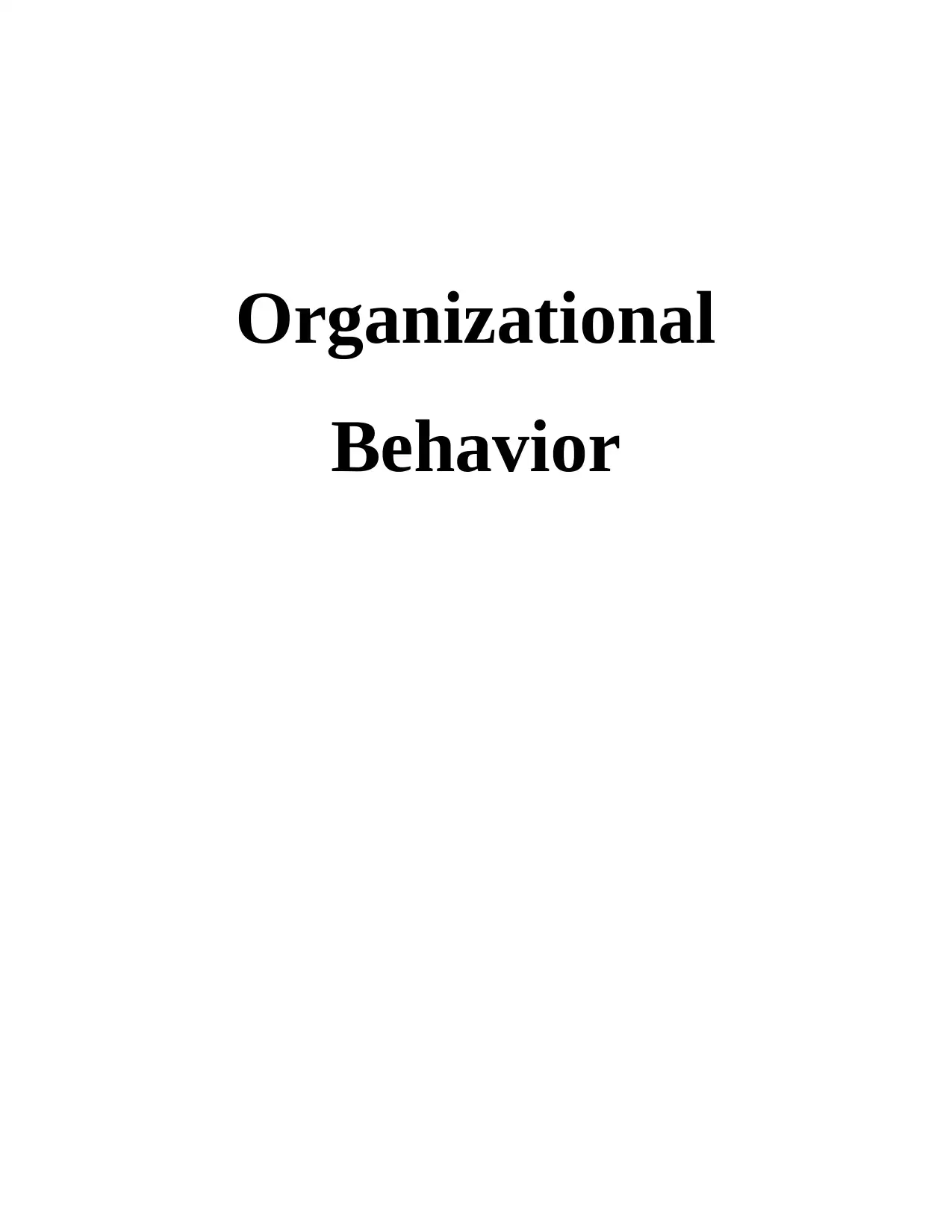
Organizational
Behavior
Behavior
Paraphrase This Document
Need a fresh take? Get an instant paraphrase of this document with our AI Paraphraser
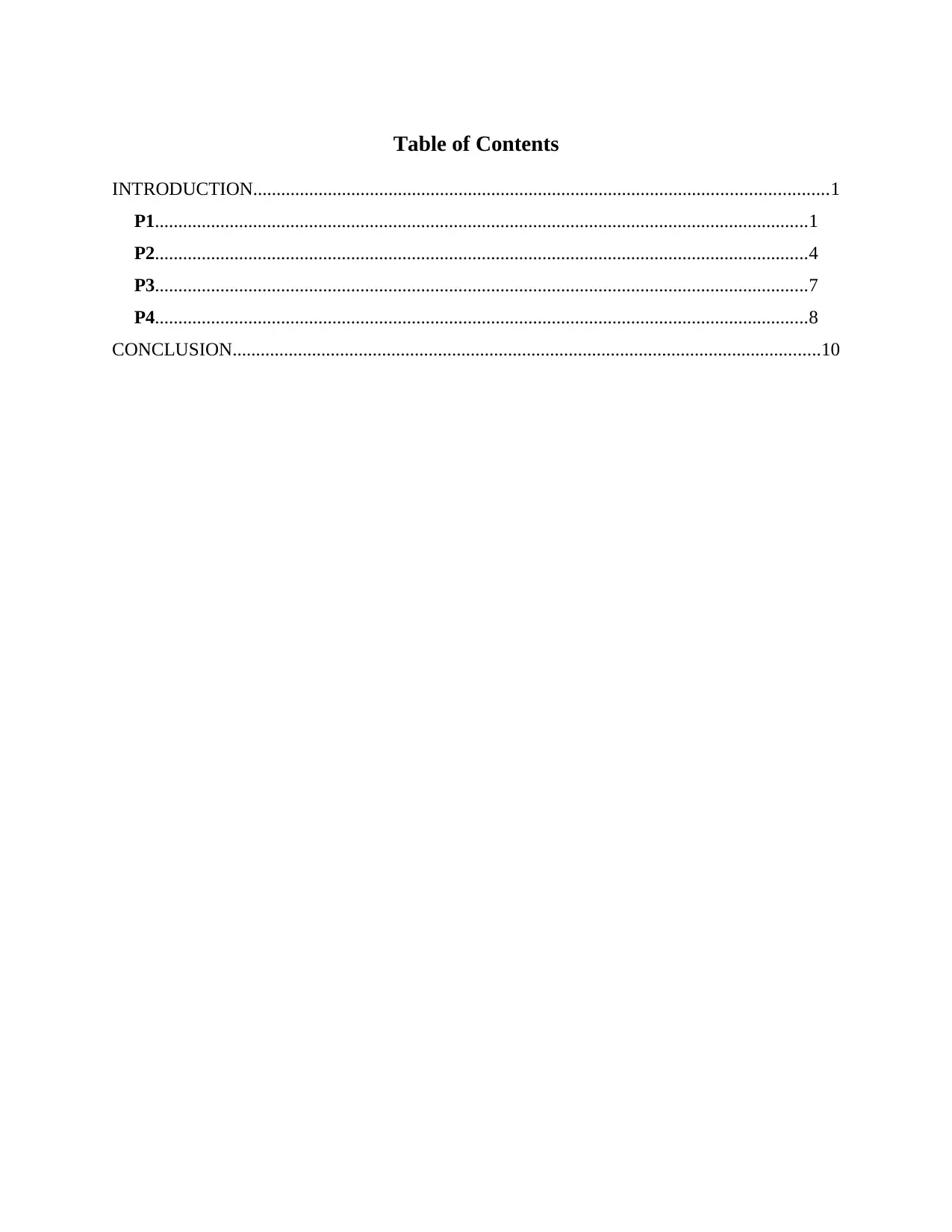
Table of Contents
INTRODUCTION...........................................................................................................................1
P1............................................................................................................................................1
P2............................................................................................................................................4
P3............................................................................................................................................7
P4............................................................................................................................................8
CONCLUSION..............................................................................................................................10
INTRODUCTION...........................................................................................................................1
P1............................................................................................................................................1
P2............................................................................................................................................4
P3............................................................................................................................................7
P4............................................................................................................................................8
CONCLUSION..............................................................................................................................10
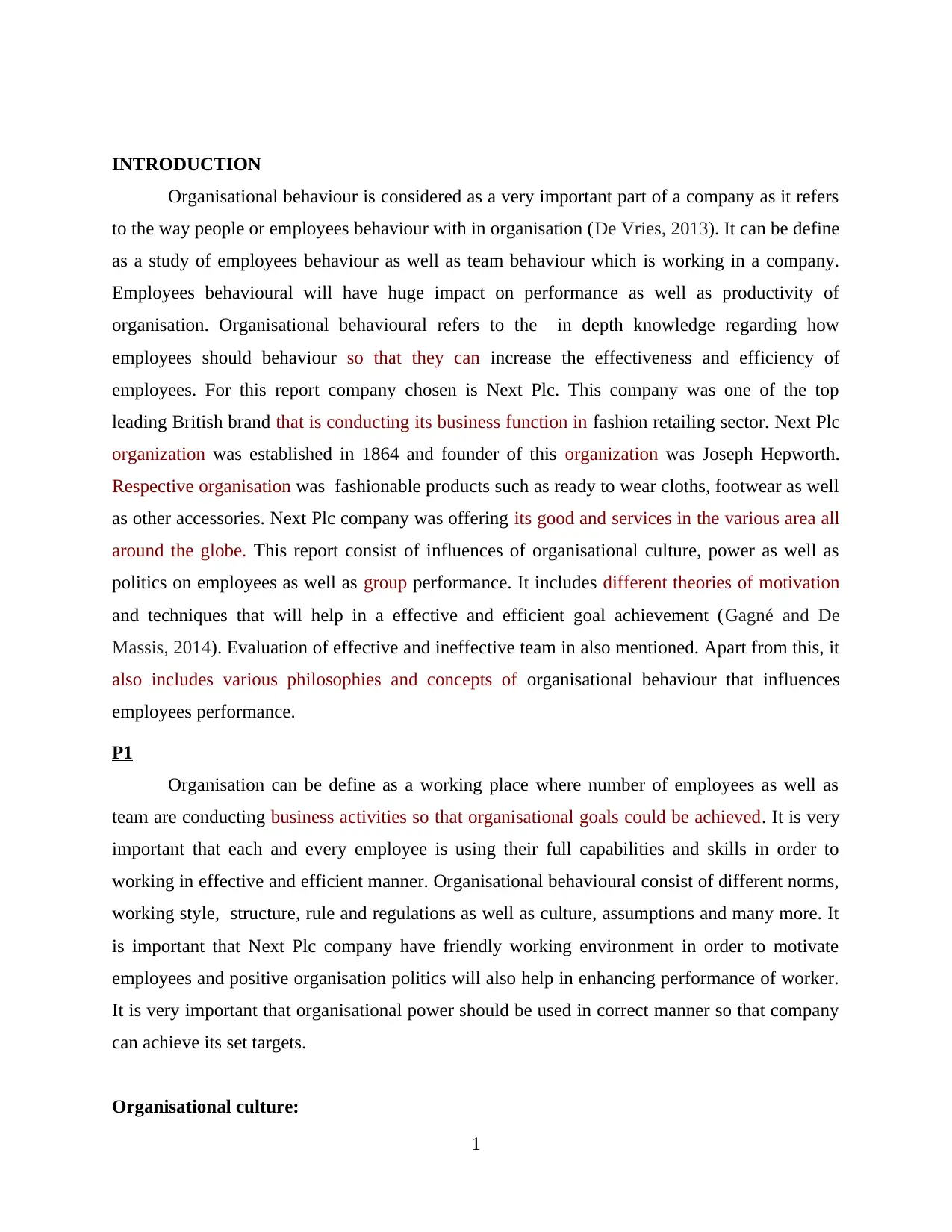
INTRODUCTION
Organisational behaviour is considered as a very important part of a company as it refers
to the way people or employees behaviour with in organisation (De Vries, 2013). It can be define
as a study of employees behaviour as well as team behaviour which is working in a company.
Employees behavioural will have huge impact on performance as well as productivity of
organisation. Organisational behavioural refers to the in depth knowledge regarding how
employees should behaviour so that they can increase the effectiveness and efficiency of
employees. For this report company chosen is Next Plc. This company was one of the top
leading British brand that is conducting its business function in fashion retailing sector. Next Plc
organization was established in 1864 and founder of this organization was Joseph Hepworth.
Respective organisation was fashionable products such as ready to wear cloths, footwear as well
as other accessories. Next Plc company was offering its good and services in the various area all
around the globe. This report consist of influences of organisational culture, power as well as
politics on employees as well as group performance. It includes different theories of motivation
and techniques that will help in a effective and efficient goal achievement (Gagné and De
Massis, 2014). Evaluation of effective and ineffective team in also mentioned. Apart from this, it
also includes various philosophies and concepts of organisational behaviour that influences
employees performance.
P1
Organisation can be define as a working place where number of employees as well as
team are conducting business activities so that organisational goals could be achieved. It is very
important that each and every employee is using their full capabilities and skills in order to
working in effective and efficient manner. Organisational behavioural consist of different norms,
working style, structure, rule and regulations as well as culture, assumptions and many more. It
is important that Next Plc company have friendly working environment in order to motivate
employees and positive organisation politics will also help in enhancing performance of worker.
It is very important that organisational power should be used in correct manner so that company
can achieve its set targets.
Organisational culture:
1
Organisational behaviour is considered as a very important part of a company as it refers
to the way people or employees behaviour with in organisation (De Vries, 2013). It can be define
as a study of employees behaviour as well as team behaviour which is working in a company.
Employees behavioural will have huge impact on performance as well as productivity of
organisation. Organisational behavioural refers to the in depth knowledge regarding how
employees should behaviour so that they can increase the effectiveness and efficiency of
employees. For this report company chosen is Next Plc. This company was one of the top
leading British brand that is conducting its business function in fashion retailing sector. Next Plc
organization was established in 1864 and founder of this organization was Joseph Hepworth.
Respective organisation was fashionable products such as ready to wear cloths, footwear as well
as other accessories. Next Plc company was offering its good and services in the various area all
around the globe. This report consist of influences of organisational culture, power as well as
politics on employees as well as group performance. It includes different theories of motivation
and techniques that will help in a effective and efficient goal achievement (Gagné and De
Massis, 2014). Evaluation of effective and ineffective team in also mentioned. Apart from this, it
also includes various philosophies and concepts of organisational behaviour that influences
employees performance.
P1
Organisation can be define as a working place where number of employees as well as
team are conducting business activities so that organisational goals could be achieved. It is very
important that each and every employee is using their full capabilities and skills in order to
working in effective and efficient manner. Organisational behavioural consist of different norms,
working style, structure, rule and regulations as well as culture, assumptions and many more. It
is important that Next Plc company have friendly working environment in order to motivate
employees and positive organisation politics will also help in enhancing performance of worker.
It is very important that organisational power should be used in correct manner so that company
can achieve its set targets.
Organisational culture:
1
⊘ This is a preview!⊘
Do you want full access?
Subscribe today to unlock all pages.

Trusted by 1+ million students worldwide
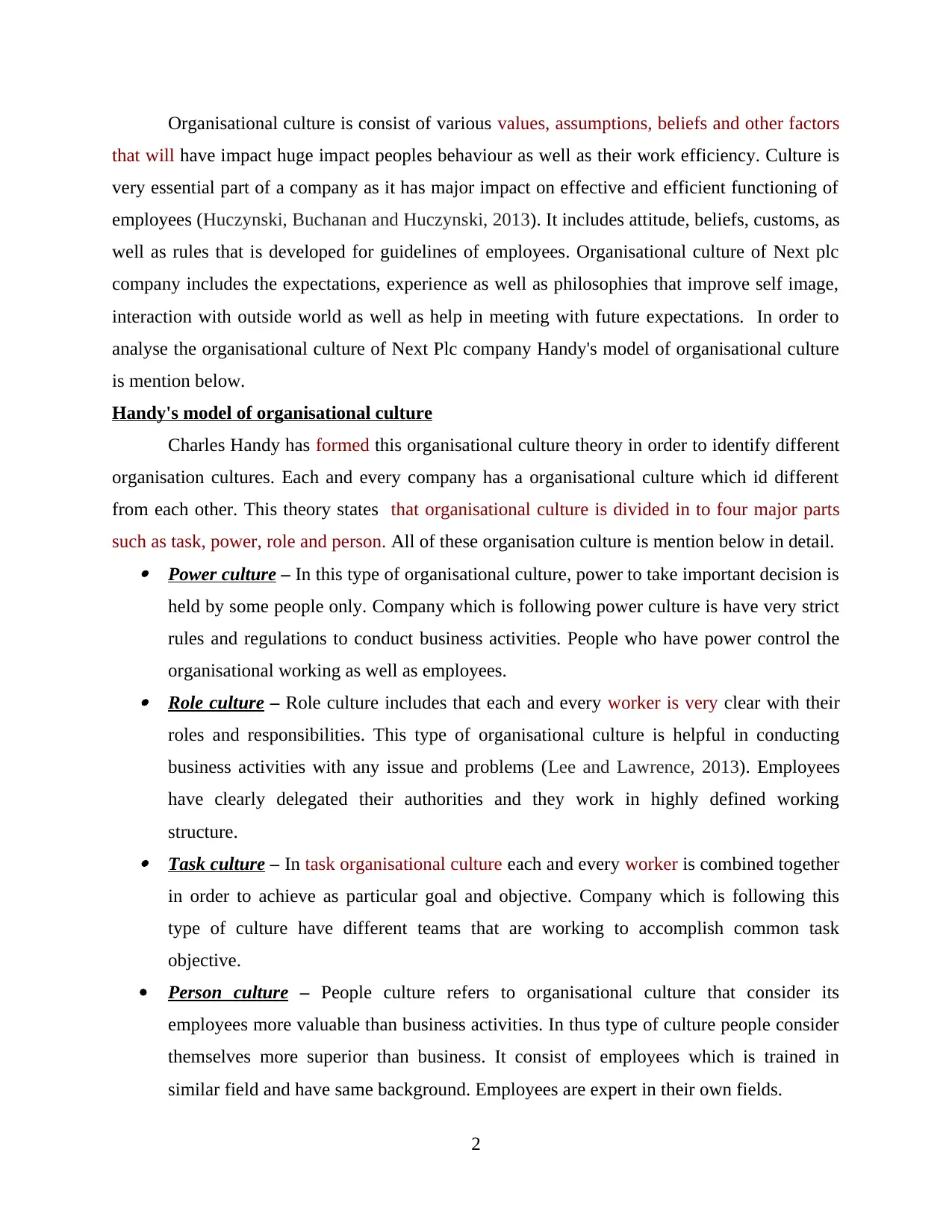
Organisational culture is consist of various values, assumptions, beliefs and other factors
that will have impact huge impact peoples behaviour as well as their work efficiency. Culture is
very essential part of a company as it has major impact on effective and efficient functioning of
employees (Huczynski, Buchanan and Huczynski, 2013). It includes attitude, beliefs, customs, as
well as rules that is developed for guidelines of employees. Organisational culture of Next plc
company includes the expectations, experience as well as philosophies that improve self image,
interaction with outside world as well as help in meeting with future expectations. In order to
analyse the organisational culture of Next Plc company Handy's model of organisational culture
is mention below.
Handy's model of organisational culture
Charles Handy has formed this organisational culture theory in order to identify different
organisation cultures. Each and every company has a organisational culture which id different
from each other. This theory states that organisational culture is divided in to four major parts
such as task, power, role and person. All of these organisation culture is mention below in detail. Power culture – In this type of organisational culture, power to take important decision is
held by some people only. Company which is following power culture is have very strict
rules and regulations to conduct business activities. People who have power control the
organisational working as well as employees. Role culture – Role culture includes that each and every worker is very clear with their
roles and responsibilities. This type of organisational culture is helpful in conducting
business activities with any issue and problems (Lee and Lawrence, 2013). Employees
have clearly delegated their authorities and they work in highly defined working
structure. Task culture – In task organisational culture each and every worker is combined together
in order to achieve as particular goal and objective. Company which is following this
type of culture have different teams that are working to accomplish common task
objective.
Person culture – People culture refers to organisational culture that consider its
employees more valuable than business activities. In thus type of culture people consider
themselves more superior than business. It consist of employees which is trained in
similar field and have same background. Employees are expert in their own fields.
2
that will have impact huge impact peoples behaviour as well as their work efficiency. Culture is
very essential part of a company as it has major impact on effective and efficient functioning of
employees (Huczynski, Buchanan and Huczynski, 2013). It includes attitude, beliefs, customs, as
well as rules that is developed for guidelines of employees. Organisational culture of Next plc
company includes the expectations, experience as well as philosophies that improve self image,
interaction with outside world as well as help in meeting with future expectations. In order to
analyse the organisational culture of Next Plc company Handy's model of organisational culture
is mention below.
Handy's model of organisational culture
Charles Handy has formed this organisational culture theory in order to identify different
organisation cultures. Each and every company has a organisational culture which id different
from each other. This theory states that organisational culture is divided in to four major parts
such as task, power, role and person. All of these organisation culture is mention below in detail. Power culture – In this type of organisational culture, power to take important decision is
held by some people only. Company which is following power culture is have very strict
rules and regulations to conduct business activities. People who have power control the
organisational working as well as employees. Role culture – Role culture includes that each and every worker is very clear with their
roles and responsibilities. This type of organisational culture is helpful in conducting
business activities with any issue and problems (Lee and Lawrence, 2013). Employees
have clearly delegated their authorities and they work in highly defined working
structure. Task culture – In task organisational culture each and every worker is combined together
in order to achieve as particular goal and objective. Company which is following this
type of culture have different teams that are working to accomplish common task
objective.
Person culture – People culture refers to organisational culture that consider its
employees more valuable than business activities. In thus type of culture people consider
themselves more superior than business. It consist of employees which is trained in
similar field and have same background. Employees are expert in their own fields.
2
Paraphrase This Document
Need a fresh take? Get an instant paraphrase of this document with our AI Paraphraser
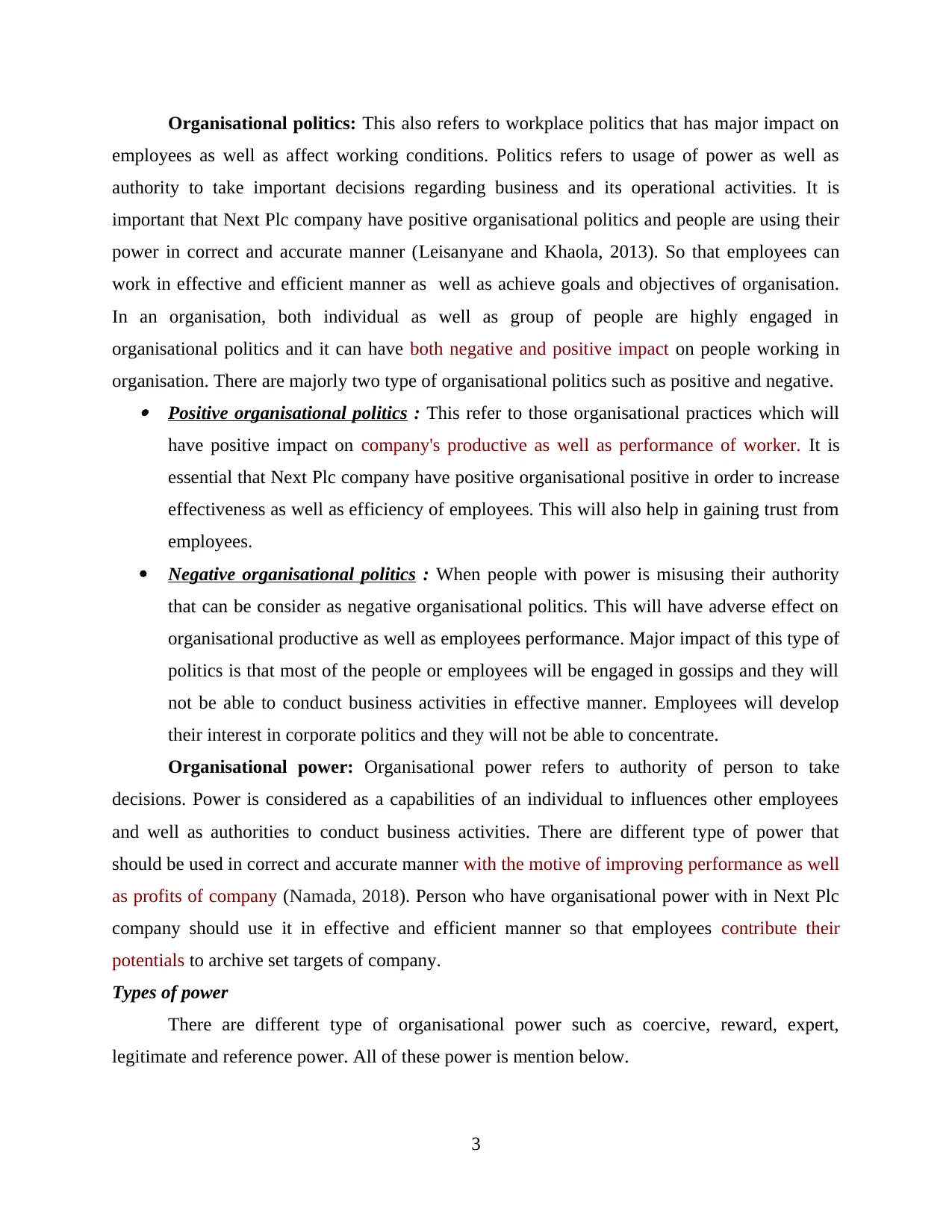
Organisational politics: This also refers to workplace politics that has major impact on
employees as well as affect working conditions. Politics refers to usage of power as well as
authority to take important decisions regarding business and its operational activities. It is
important that Next Plc company have positive organisational politics and people are using their
power in correct and accurate manner (Leisanyane and Khaola, 2013). So that employees can
work in effective and efficient manner as well as achieve goals and objectives of organisation.
In an organisation, both individual as well as group of people are highly engaged in
organisational politics and it can have both negative and positive impact on people working in
organisation. There are majorly two type of organisational politics such as positive and negative. Positive organisational politics : This refer to those organisational practices which will
have positive impact on company's productive as well as performance of worker. It is
essential that Next Plc company have positive organisational positive in order to increase
effectiveness as well as efficiency of employees. This will also help in gaining trust from
employees.
Negative organisational politics : When people with power is misusing their authority
that can be consider as negative organisational politics. This will have adverse effect on
organisational productive as well as employees performance. Major impact of this type of
politics is that most of the people or employees will be engaged in gossips and they will
not be able to conduct business activities in effective manner. Employees will develop
their interest in corporate politics and they will not be able to concentrate.
Organisational power: Organisational power refers to authority of person to take
decisions. Power is considered as a capabilities of an individual to influences other employees
and well as authorities to conduct business activities. There are different type of power that
should be used in correct and accurate manner with the motive of improving performance as well
as profits of company (Namada, 2018). Person who have organisational power with in Next Plc
company should use it in effective and efficient manner so that employees contribute their
potentials to archive set targets of company.
Types of power
There are different type of organisational power such as coercive, reward, expert,
legitimate and reference power. All of these power is mention below.
3
employees as well as affect working conditions. Politics refers to usage of power as well as
authority to take important decisions regarding business and its operational activities. It is
important that Next Plc company have positive organisational politics and people are using their
power in correct and accurate manner (Leisanyane and Khaola, 2013). So that employees can
work in effective and efficient manner as well as achieve goals and objectives of organisation.
In an organisation, both individual as well as group of people are highly engaged in
organisational politics and it can have both negative and positive impact on people working in
organisation. There are majorly two type of organisational politics such as positive and negative. Positive organisational politics : This refer to those organisational practices which will
have positive impact on company's productive as well as performance of worker. It is
essential that Next Plc company have positive organisational positive in order to increase
effectiveness as well as efficiency of employees. This will also help in gaining trust from
employees.
Negative organisational politics : When people with power is misusing their authority
that can be consider as negative organisational politics. This will have adverse effect on
organisational productive as well as employees performance. Major impact of this type of
politics is that most of the people or employees will be engaged in gossips and they will
not be able to conduct business activities in effective manner. Employees will develop
their interest in corporate politics and they will not be able to concentrate.
Organisational power: Organisational power refers to authority of person to take
decisions. Power is considered as a capabilities of an individual to influences other employees
and well as authorities to conduct business activities. There are different type of power that
should be used in correct and accurate manner with the motive of improving performance as well
as profits of company (Namada, 2018). Person who have organisational power with in Next Plc
company should use it in effective and efficient manner so that employees contribute their
potentials to archive set targets of company.
Types of power
There are different type of organisational power such as coercive, reward, expert,
legitimate and reference power. All of these power is mention below.
3
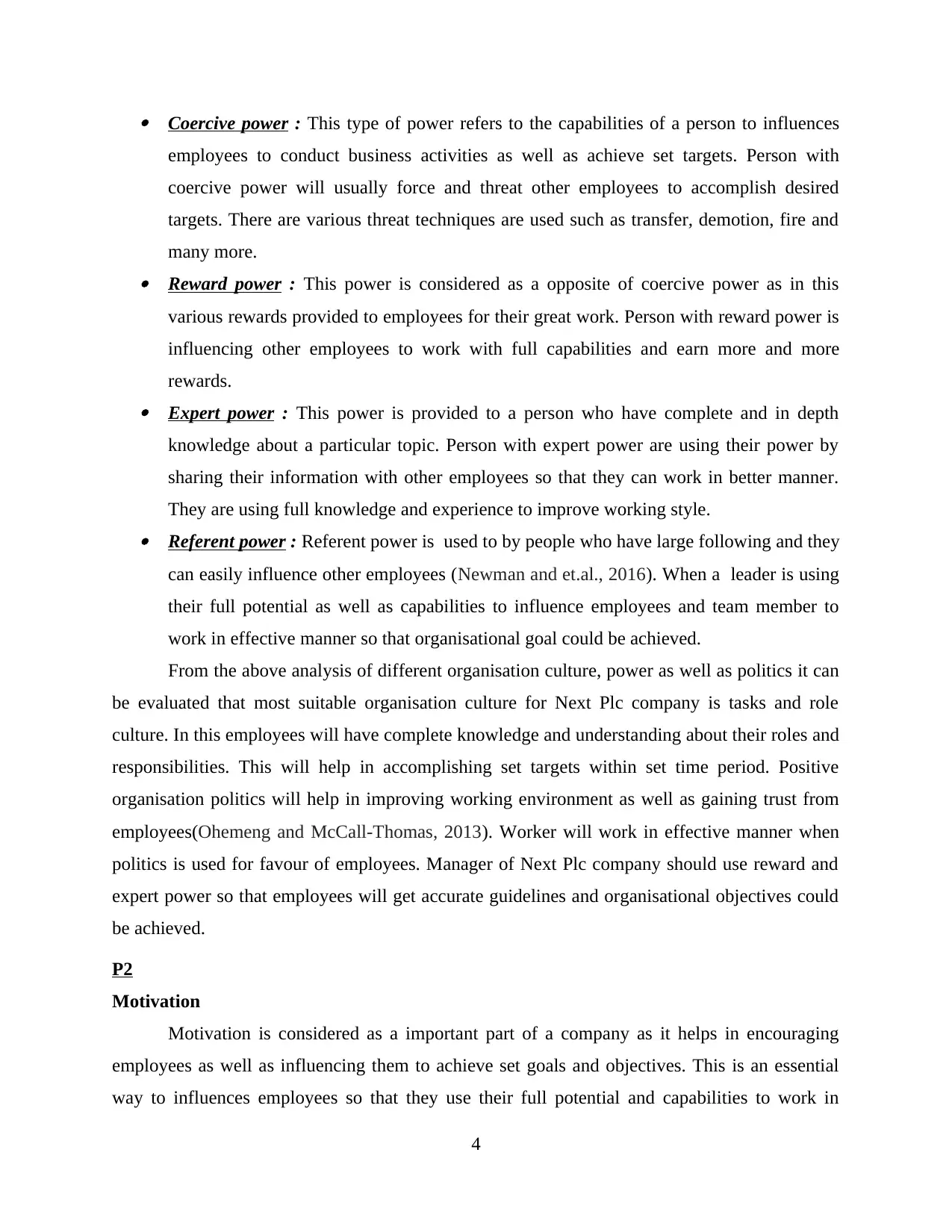
Coercive power : This type of power refers to the capabilities of a person to influences
employees to conduct business activities as well as achieve set targets. Person with
coercive power will usually force and threat other employees to accomplish desired
targets. There are various threat techniques are used such as transfer, demotion, fire and
many more. Reward power : This power is considered as a opposite of coercive power as in this
various rewards provided to employees for their great work. Person with reward power is
influencing other employees to work with full capabilities and earn more and more
rewards. Expert power : This power is provided to a person who have complete and in depth
knowledge about a particular topic. Person with expert power are using their power by
sharing their information with other employees so that they can work in better manner.
They are using full knowledge and experience to improve working style. Referent power : Referent power is used to by people who have large following and they
can easily influence other employees (Newman and et.al., 2016). When a leader is using
their full potential as well as capabilities to influence employees and team member to
work in effective manner so that organisational goal could be achieved.
From the above analysis of different organisation culture, power as well as politics it can
be evaluated that most suitable organisation culture for Next Plc company is tasks and role
culture. In this employees will have complete knowledge and understanding about their roles and
responsibilities. This will help in accomplishing set targets within set time period. Positive
organisation politics will help in improving working environment as well as gaining trust from
employees(Ohemeng and McCall‐Thomas, 2013). Worker will work in effective manner when
politics is used for favour of employees. Manager of Next Plc company should use reward and
expert power so that employees will get accurate guidelines and organisational objectives could
be achieved.
P2
Motivation
Motivation is considered as a important part of a company as it helps in encouraging
employees as well as influencing them to achieve set goals and objectives. This is an essential
way to influences employees so that they use their full potential and capabilities to work in
4
employees to conduct business activities as well as achieve set targets. Person with
coercive power will usually force and threat other employees to accomplish desired
targets. There are various threat techniques are used such as transfer, demotion, fire and
many more. Reward power : This power is considered as a opposite of coercive power as in this
various rewards provided to employees for their great work. Person with reward power is
influencing other employees to work with full capabilities and earn more and more
rewards. Expert power : This power is provided to a person who have complete and in depth
knowledge about a particular topic. Person with expert power are using their power by
sharing their information with other employees so that they can work in better manner.
They are using full knowledge and experience to improve working style. Referent power : Referent power is used to by people who have large following and they
can easily influence other employees (Newman and et.al., 2016). When a leader is using
their full potential as well as capabilities to influence employees and team member to
work in effective manner so that organisational goal could be achieved.
From the above analysis of different organisation culture, power as well as politics it can
be evaluated that most suitable organisation culture for Next Plc company is tasks and role
culture. In this employees will have complete knowledge and understanding about their roles and
responsibilities. This will help in accomplishing set targets within set time period. Positive
organisation politics will help in improving working environment as well as gaining trust from
employees(Ohemeng and McCall‐Thomas, 2013). Worker will work in effective manner when
politics is used for favour of employees. Manager of Next Plc company should use reward and
expert power so that employees will get accurate guidelines and organisational objectives could
be achieved.
P2
Motivation
Motivation is considered as a important part of a company as it helps in encouraging
employees as well as influencing them to achieve set goals and objectives. This is an essential
way to influences employees so that they use their full potential and capabilities to work in
4
⊘ This is a preview!⊘
Do you want full access?
Subscribe today to unlock all pages.

Trusted by 1+ million students worldwide
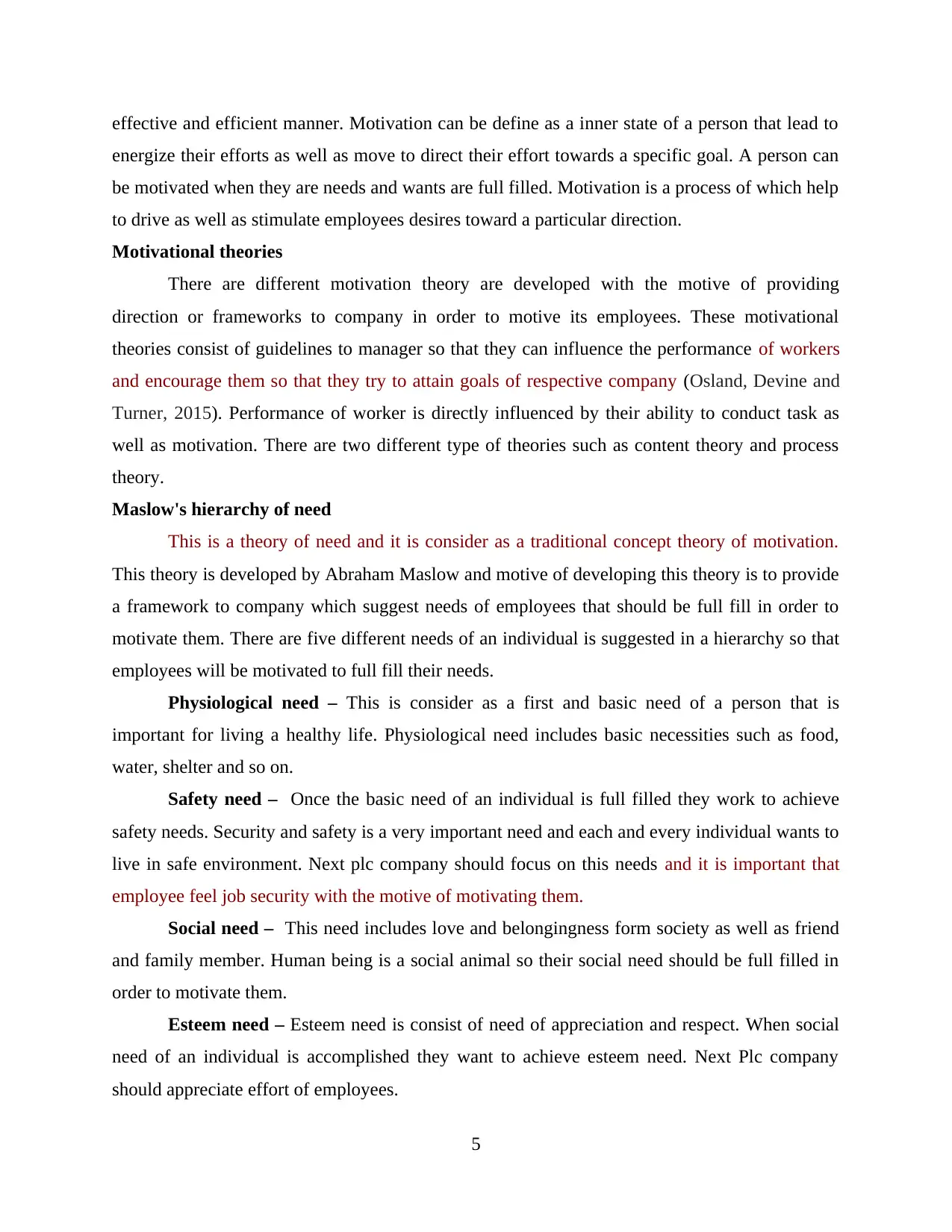
effective and efficient manner. Motivation can be define as a inner state of a person that lead to
energize their efforts as well as move to direct their effort towards a specific goal. A person can
be motivated when they are needs and wants are full filled. Motivation is a process of which help
to drive as well as stimulate employees desires toward a particular direction.
Motivational theories
There are different motivation theory are developed with the motive of providing
direction or frameworks to company in order to motive its employees. These motivational
theories consist of guidelines to manager so that they can influence the performance of workers
and encourage them so that they try to attain goals of respective company (Osland, Devine and
Turner, 2015). Performance of worker is directly influenced by their ability to conduct task as
well as motivation. There are two different type of theories such as content theory and process
theory.
Maslow's hierarchy of need
This is a theory of need and it is consider as a traditional concept theory of motivation.
This theory is developed by Abraham Maslow and motive of developing this theory is to provide
a framework to company which suggest needs of employees that should be full fill in order to
motivate them. There are five different needs of an individual is suggested in a hierarchy so that
employees will be motivated to full fill their needs.
Physiological need – This is consider as a first and basic need of a person that is
important for living a healthy life. Physiological need includes basic necessities such as food,
water, shelter and so on.
Safety need – Once the basic need of an individual is full filled they work to achieve
safety needs. Security and safety is a very important need and each and every individual wants to
live in safe environment. Next plc company should focus on this needs and it is important that
employee feel job security with the motive of motivating them.
Social need – This need includes love and belongingness form society as well as friend
and family member. Human being is a social animal so their social need should be full filled in
order to motivate them.
Esteem need – Esteem need is consist of need of appreciation and respect. When social
need of an individual is accomplished they want to achieve esteem need. Next Plc company
should appreciate effort of employees.
5
energize their efforts as well as move to direct their effort towards a specific goal. A person can
be motivated when they are needs and wants are full filled. Motivation is a process of which help
to drive as well as stimulate employees desires toward a particular direction.
Motivational theories
There are different motivation theory are developed with the motive of providing
direction or frameworks to company in order to motive its employees. These motivational
theories consist of guidelines to manager so that they can influence the performance of workers
and encourage them so that they try to attain goals of respective company (Osland, Devine and
Turner, 2015). Performance of worker is directly influenced by their ability to conduct task as
well as motivation. There are two different type of theories such as content theory and process
theory.
Maslow's hierarchy of need
This is a theory of need and it is consider as a traditional concept theory of motivation.
This theory is developed by Abraham Maslow and motive of developing this theory is to provide
a framework to company which suggest needs of employees that should be full fill in order to
motivate them. There are five different needs of an individual is suggested in a hierarchy so that
employees will be motivated to full fill their needs.
Physiological need – This is consider as a first and basic need of a person that is
important for living a healthy life. Physiological need includes basic necessities such as food,
water, shelter and so on.
Safety need – Once the basic need of an individual is full filled they work to achieve
safety needs. Security and safety is a very important need and each and every individual wants to
live in safe environment. Next plc company should focus on this needs and it is important that
employee feel job security with the motive of motivating them.
Social need – This need includes love and belongingness form society as well as friend
and family member. Human being is a social animal so their social need should be full filled in
order to motivate them.
Esteem need – Esteem need is consist of need of appreciation and respect. When social
need of an individual is accomplished they want to achieve esteem need. Next Plc company
should appreciate effort of employees.
5
Paraphrase This Document
Need a fresh take? Get an instant paraphrase of this document with our AI Paraphraser
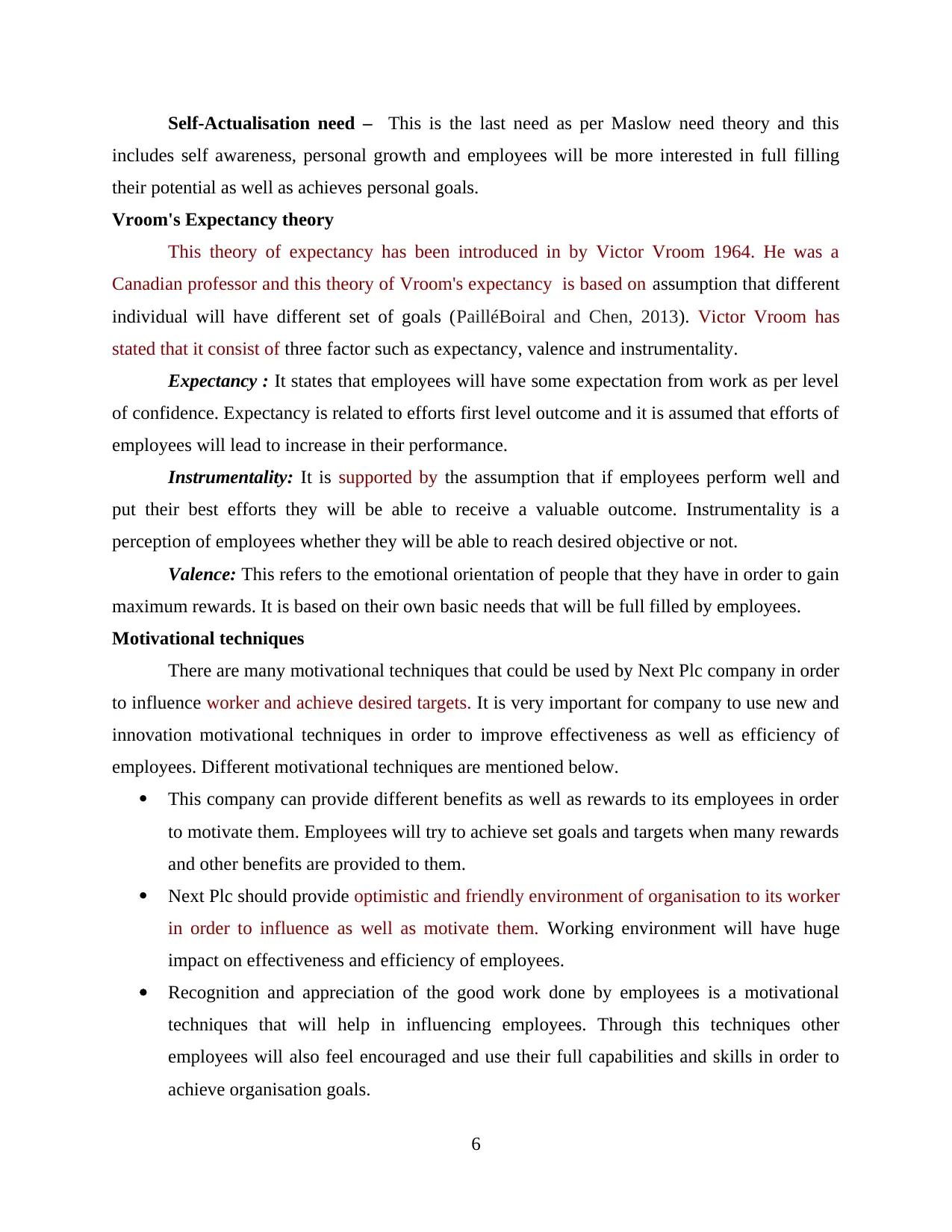
Self-Actualisation need – This is the last need as per Maslow need theory and this
includes self awareness, personal growth and employees will be more interested in full filling
their potential as well as achieves personal goals.
Vroom's Expectancy theory
This theory of expectancy has been introduced in by Victor Vroom 1964. He was a
Canadian professor and this theory of Vroom's expectancy is based on assumption that different
individual will have different set of goals (PailléBoiral and Chen, 2013). Victor Vroom has
stated that it consist of three factor such as expectancy, valence and instrumentality.
Expectancy : It states that employees will have some expectation from work as per level
of confidence. Expectancy is related to efforts first level outcome and it is assumed that efforts of
employees will lead to increase in their performance.
Instrumentality: It is supported by the assumption that if employees perform well and
put their best efforts they will be able to receive a valuable outcome. Instrumentality is a
perception of employees whether they will be able to reach desired objective or not.
Valence: This refers to the emotional orientation of people that they have in order to gain
maximum rewards. It is based on their own basic needs that will be full filled by employees.
Motivational techniques
There are many motivational techniques that could be used by Next Plc company in order
to influence worker and achieve desired targets. It is very important for company to use new and
innovation motivational techniques in order to improve effectiveness as well as efficiency of
employees. Different motivational techniques are mentioned below.
This company can provide different benefits as well as rewards to its employees in order
to motivate them. Employees will try to achieve set goals and targets when many rewards
and other benefits are provided to them.
Next Plc should provide optimistic and friendly environment of organisation to its worker
in order to influence as well as motivate them. Working environment will have huge
impact on effectiveness and efficiency of employees.
Recognition and appreciation of the good work done by employees is a motivational
techniques that will help in influencing employees. Through this techniques other
employees will also feel encouraged and use their full capabilities and skills in order to
achieve organisation goals.
6
includes self awareness, personal growth and employees will be more interested in full filling
their potential as well as achieves personal goals.
Vroom's Expectancy theory
This theory of expectancy has been introduced in by Victor Vroom 1964. He was a
Canadian professor and this theory of Vroom's expectancy is based on assumption that different
individual will have different set of goals (PailléBoiral and Chen, 2013). Victor Vroom has
stated that it consist of three factor such as expectancy, valence and instrumentality.
Expectancy : It states that employees will have some expectation from work as per level
of confidence. Expectancy is related to efforts first level outcome and it is assumed that efforts of
employees will lead to increase in their performance.
Instrumentality: It is supported by the assumption that if employees perform well and
put their best efforts they will be able to receive a valuable outcome. Instrumentality is a
perception of employees whether they will be able to reach desired objective or not.
Valence: This refers to the emotional orientation of people that they have in order to gain
maximum rewards. It is based on their own basic needs that will be full filled by employees.
Motivational techniques
There are many motivational techniques that could be used by Next Plc company in order
to influence worker and achieve desired targets. It is very important for company to use new and
innovation motivational techniques in order to improve effectiveness as well as efficiency of
employees. Different motivational techniques are mentioned below.
This company can provide different benefits as well as rewards to its employees in order
to motivate them. Employees will try to achieve set goals and targets when many rewards
and other benefits are provided to them.
Next Plc should provide optimistic and friendly environment of organisation to its worker
in order to influence as well as motivate them. Working environment will have huge
impact on effectiveness and efficiency of employees.
Recognition and appreciation of the good work done by employees is a motivational
techniques that will help in influencing employees. Through this techniques other
employees will also feel encouraged and use their full capabilities and skills in order to
achieve organisation goals.
6
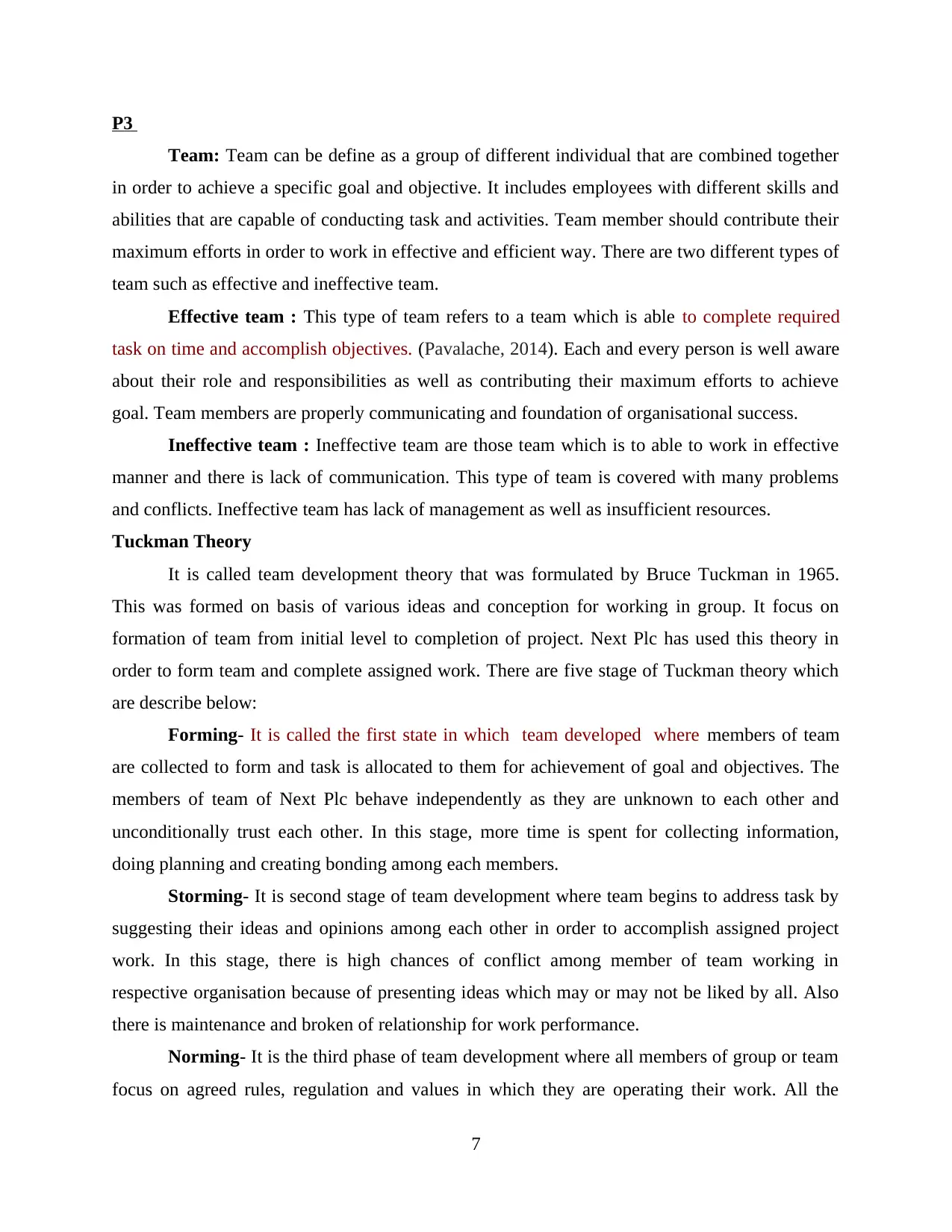
P3
Team: Team can be define as a group of different individual that are combined together
in order to achieve a specific goal and objective. It includes employees with different skills and
abilities that are capable of conducting task and activities. Team member should contribute their
maximum efforts in order to work in effective and efficient way. There are two different types of
team such as effective and ineffective team.
Effective team : This type of team refers to a team which is able to complete required
task on time and accomplish objectives. (Pavalache, 2014). Each and every person is well aware
about their role and responsibilities as well as contributing their maximum efforts to achieve
goal. Team members are properly communicating and foundation of organisational success.
Ineffective team : Ineffective team are those team which is to able to work in effective
manner and there is lack of communication. This type of team is covered with many problems
and conflicts. Ineffective team has lack of management as well as insufficient resources.
Tuckman Theory
It is called team development theory that was formulated by Bruce Tuckman in 1965.
This was formed on basis of various ideas and conception for working in group. It focus on
formation of team from initial level to completion of project. Next Plc has used this theory in
order to form team and complete assigned work. There are five stage of Tuckman theory which
are describe below:
Forming- It is called the first state in which team developed where members of team
are collected to form and task is allocated to them for achievement of goal and objectives. The
members of team of Next Plc behave independently as they are unknown to each other and
unconditionally trust each other. In this stage, more time is spent for collecting information,
doing planning and creating bonding among each members.
Storming- It is second stage of team development where team begins to address task by
suggesting their ideas and opinions among each other in order to accomplish assigned project
work. In this stage, there is high chances of conflict among member of team working in
respective organisation because of presenting ideas which may or may not be liked by all. Also
there is maintenance and broken of relationship for work performance.
Norming- It is the third phase of team development where all members of group or team
focus on agreed rules, regulation and values in which they are operating their work. All the
7
Team: Team can be define as a group of different individual that are combined together
in order to achieve a specific goal and objective. It includes employees with different skills and
abilities that are capable of conducting task and activities. Team member should contribute their
maximum efforts in order to work in effective and efficient way. There are two different types of
team such as effective and ineffective team.
Effective team : This type of team refers to a team which is able to complete required
task on time and accomplish objectives. (Pavalache, 2014). Each and every person is well aware
about their role and responsibilities as well as contributing their maximum efforts to achieve
goal. Team members are properly communicating and foundation of organisational success.
Ineffective team : Ineffective team are those team which is to able to work in effective
manner and there is lack of communication. This type of team is covered with many problems
and conflicts. Ineffective team has lack of management as well as insufficient resources.
Tuckman Theory
It is called team development theory that was formulated by Bruce Tuckman in 1965.
This was formed on basis of various ideas and conception for working in group. It focus on
formation of team from initial level to completion of project. Next Plc has used this theory in
order to form team and complete assigned work. There are five stage of Tuckman theory which
are describe below:
Forming- It is called the first state in which team developed where members of team
are collected to form and task is allocated to them for achievement of goal and objectives. The
members of team of Next Plc behave independently as they are unknown to each other and
unconditionally trust each other. In this stage, more time is spent for collecting information,
doing planning and creating bonding among each members.
Storming- It is second stage of team development where team begins to address task by
suggesting their ideas and opinions among each other in order to accomplish assigned project
work. In this stage, there is high chances of conflict among member of team working in
respective organisation because of presenting ideas which may or may not be liked by all. Also
there is maintenance and broken of relationship for work performance.
Norming- It is the third phase of team development where all members of group or team
focus on agreed rules, regulation and values in which they are operating their work. All the
7
⊘ This is a preview!⊘
Do you want full access?
Subscribe today to unlock all pages.

Trusted by 1+ million students worldwide
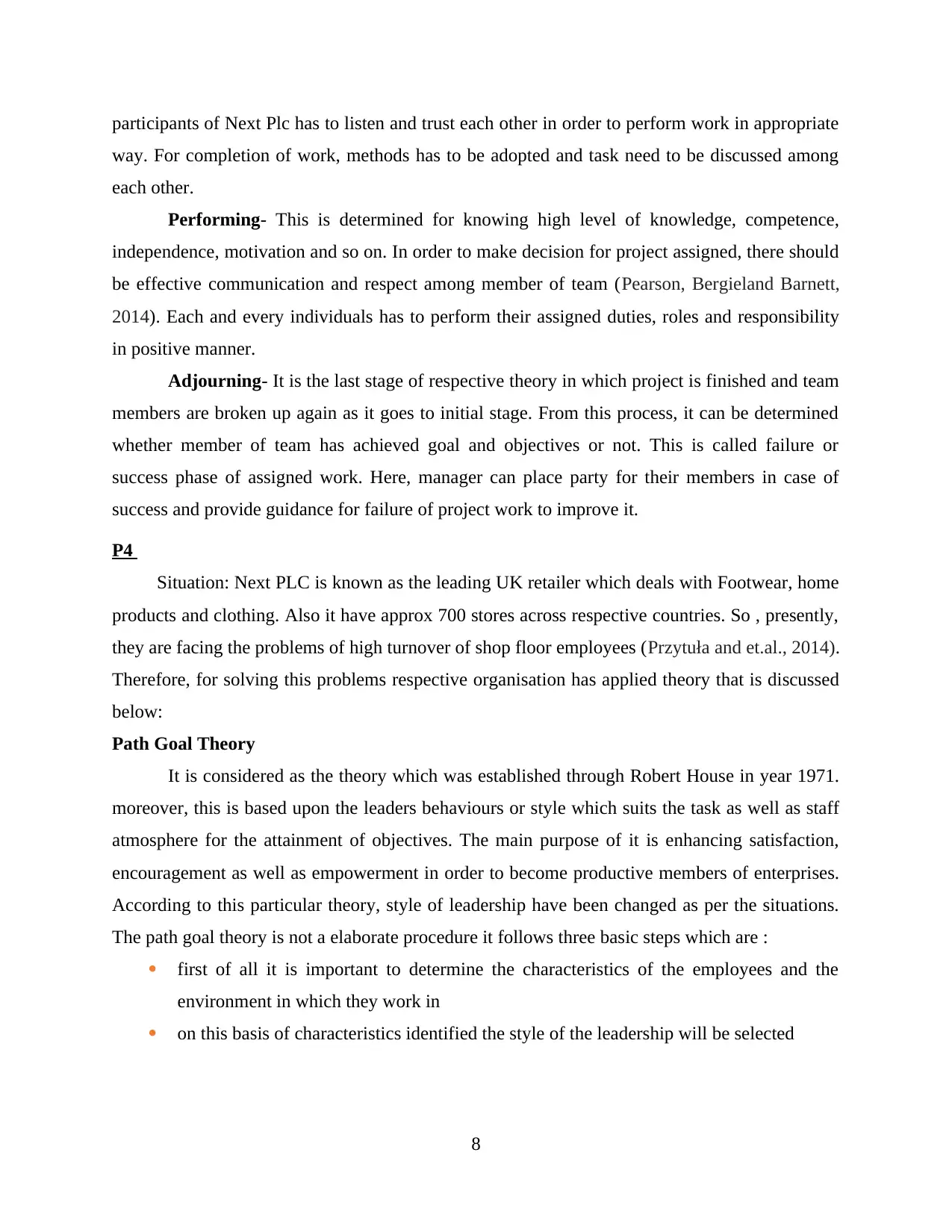
participants of Next Plc has to listen and trust each other in order to perform work in appropriate
way. For completion of work, methods has to be adopted and task need to be discussed among
each other.
Performing- This is determined for knowing high level of knowledge, competence,
independence, motivation and so on. In order to make decision for project assigned, there should
be effective communication and respect among member of team (Pearson, Bergieland Barnett,
2014). Each and every individuals has to perform their assigned duties, roles and responsibility
in positive manner.
Adjourning- It is the last stage of respective theory in which project is finished and team
members are broken up again as it goes to initial stage. From this process, it can be determined
whether member of team has achieved goal and objectives or not. This is called failure or
success phase of assigned work. Here, manager can place party for their members in case of
success and provide guidance for failure of project work to improve it.
P4
Situation: Next PLC is known as the leading UK retailer which deals with Footwear, home
products and clothing. Also it have approx 700 stores across respective countries. So , presently,
they are facing the problems of high turnover of shop floor employees (Przytuła and et.al., 2014).
Therefore, for solving this problems respective organisation has applied theory that is discussed
below:
Path Goal Theory
It is considered as the theory which was established through Robert House in year 1971.
moreover, this is based upon the leaders behaviours or style which suits the task as well as staff
atmosphere for the attainment of objectives. The main purpose of it is enhancing satisfaction,
encouragement as well as empowerment in order to become productive members of enterprises.
According to this particular theory, style of leadership have been changed as per the situations.
The path goal theory is not a elaborate procedure it follows three basic steps which are :
first of all it is important to determine the characteristics of the employees and the
environment in which they work in
on this basis of characteristics identified the style of the leadership will be selected
8
way. For completion of work, methods has to be adopted and task need to be discussed among
each other.
Performing- This is determined for knowing high level of knowledge, competence,
independence, motivation and so on. In order to make decision for project assigned, there should
be effective communication and respect among member of team (Pearson, Bergieland Barnett,
2014). Each and every individuals has to perform their assigned duties, roles and responsibility
in positive manner.
Adjourning- It is the last stage of respective theory in which project is finished and team
members are broken up again as it goes to initial stage. From this process, it can be determined
whether member of team has achieved goal and objectives or not. This is called failure or
success phase of assigned work. Here, manager can place party for their members in case of
success and provide guidance for failure of project work to improve it.
P4
Situation: Next PLC is known as the leading UK retailer which deals with Footwear, home
products and clothing. Also it have approx 700 stores across respective countries. So , presently,
they are facing the problems of high turnover of shop floor employees (Przytuła and et.al., 2014).
Therefore, for solving this problems respective organisation has applied theory that is discussed
below:
Path Goal Theory
It is considered as the theory which was established through Robert House in year 1971.
moreover, this is based upon the leaders behaviours or style which suits the task as well as staff
atmosphere for the attainment of objectives. The main purpose of it is enhancing satisfaction,
encouragement as well as empowerment in order to become productive members of enterprises.
According to this particular theory, style of leadership have been changed as per the situations.
The path goal theory is not a elaborate procedure it follows three basic steps which are :
first of all it is important to determine the characteristics of the employees and the
environment in which they work in
on this basis of characteristics identified the style of the leadership will be selected
8
Paraphrase This Document
Need a fresh take? Get an instant paraphrase of this document with our AI Paraphraser
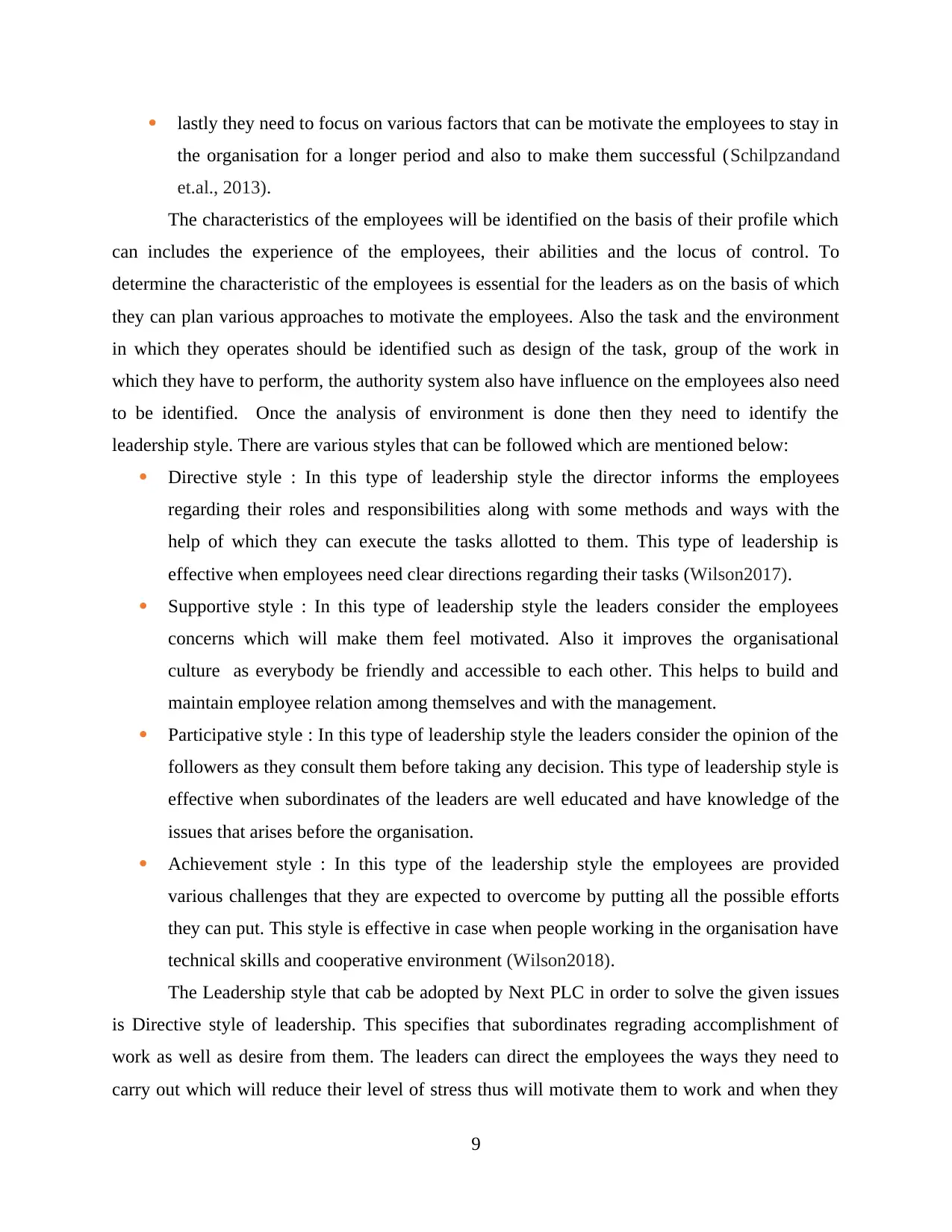
lastly they need to focus on various factors that can be motivate the employees to stay in
the organisation for a longer period and also to make them successful (Schilpzandand
et.al., 2013).
The characteristics of the employees will be identified on the basis of their profile which
can includes the experience of the employees, their abilities and the locus of control. To
determine the characteristic of the employees is essential for the leaders as on the basis of which
they can plan various approaches to motivate the employees. Also the task and the environment
in which they operates should be identified such as design of the task, group of the work in
which they have to perform, the authority system also have influence on the employees also need
to be identified. Once the analysis of environment is done then they need to identify the
leadership style. There are various styles that can be followed which are mentioned below:
Directive style : In this type of leadership style the director informs the employees
regarding their roles and responsibilities along with some methods and ways with the
help of which they can execute the tasks allotted to them. This type of leadership is
effective when employees need clear directions regarding their tasks (Wilson2017).
Supportive style : In this type of leadership style the leaders consider the employees
concerns which will make them feel motivated. Also it improves the organisational
culture as everybody be friendly and accessible to each other. This helps to build and
maintain employee relation among themselves and with the management.
Participative style : In this type of leadership style the leaders consider the opinion of the
followers as they consult them before taking any decision. This type of leadership style is
effective when subordinates of the leaders are well educated and have knowledge of the
issues that arises before the organisation.
Achievement style : In this type of the leadership style the employees are provided
various challenges that they are expected to overcome by putting all the possible efforts
they can put. This style is effective in case when people working in the organisation have
technical skills and cooperative environment (Wilson2018).
The Leadership style that cab be adopted by Next PLC in order to solve the given issues
is Directive style of leadership. This specifies that subordinates regrading accomplishment of
work as well as desire from them. The leaders can direct the employees the ways they need to
carry out which will reduce their level of stress thus will motivate them to work and when they
9
the organisation for a longer period and also to make them successful (Schilpzandand
et.al., 2013).
The characteristics of the employees will be identified on the basis of their profile which
can includes the experience of the employees, their abilities and the locus of control. To
determine the characteristic of the employees is essential for the leaders as on the basis of which
they can plan various approaches to motivate the employees. Also the task and the environment
in which they operates should be identified such as design of the task, group of the work in
which they have to perform, the authority system also have influence on the employees also need
to be identified. Once the analysis of environment is done then they need to identify the
leadership style. There are various styles that can be followed which are mentioned below:
Directive style : In this type of leadership style the director informs the employees
regarding their roles and responsibilities along with some methods and ways with the
help of which they can execute the tasks allotted to them. This type of leadership is
effective when employees need clear directions regarding their tasks (Wilson2017).
Supportive style : In this type of leadership style the leaders consider the employees
concerns which will make them feel motivated. Also it improves the organisational
culture as everybody be friendly and accessible to each other. This helps to build and
maintain employee relation among themselves and with the management.
Participative style : In this type of leadership style the leaders consider the opinion of the
followers as they consult them before taking any decision. This type of leadership style is
effective when subordinates of the leaders are well educated and have knowledge of the
issues that arises before the organisation.
Achievement style : In this type of the leadership style the employees are provided
various challenges that they are expected to overcome by putting all the possible efforts
they can put. This style is effective in case when people working in the organisation have
technical skills and cooperative environment (Wilson2018).
The Leadership style that cab be adopted by Next PLC in order to solve the given issues
is Directive style of leadership. This specifies that subordinates regrading accomplishment of
work as well as desire from them. The leaders can direct the employees the ways they need to
carry out which will reduce their level of stress thus will motivate them to work and when they
9
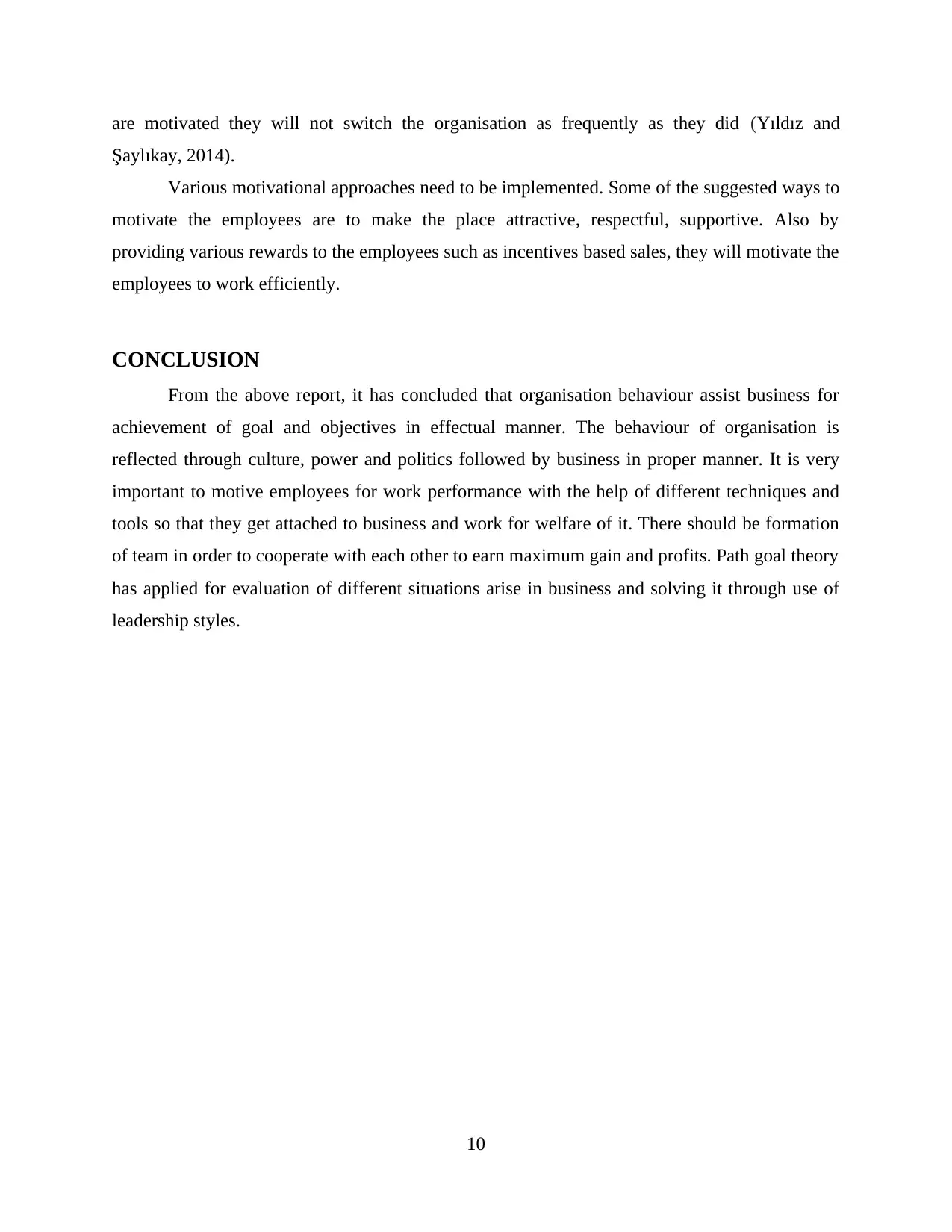
are motivated they will not switch the organisation as frequently as they did (Yıldız and
Şaylıkay, 2014).
Various motivational approaches need to be implemented. Some of the suggested ways to
motivate the employees are to make the place attractive, respectful, supportive. Also by
providing various rewards to the employees such as incentives based sales, they will motivate the
employees to work efficiently.
CONCLUSION
From the above report, it has concluded that organisation behaviour assist business for
achievement of goal and objectives in effectual manner. The behaviour of organisation is
reflected through culture, power and politics followed by business in proper manner. It is very
important to motive employees for work performance with the help of different techniques and
tools so that they get attached to business and work for welfare of it. There should be formation
of team in order to cooperate with each other to earn maximum gain and profits. Path goal theory
has applied for evaluation of different situations arise in business and solving it through use of
leadership styles.
10
Şaylıkay, 2014).
Various motivational approaches need to be implemented. Some of the suggested ways to
motivate the employees are to make the place attractive, respectful, supportive. Also by
providing various rewards to the employees such as incentives based sales, they will motivate the
employees to work efficiently.
CONCLUSION
From the above report, it has concluded that organisation behaviour assist business for
achievement of goal and objectives in effectual manner. The behaviour of organisation is
reflected through culture, power and politics followed by business in proper manner. It is very
important to motive employees for work performance with the help of different techniques and
tools so that they get attached to business and work for welfare of it. There should be formation
of team in order to cooperate with each other to earn maximum gain and profits. Path goal theory
has applied for evaluation of different situations arise in business and solving it through use of
leadership styles.
10
⊘ This is a preview!⊘
Do you want full access?
Subscribe today to unlock all pages.

Trusted by 1+ million students worldwide
1 out of 14
Related Documents
Your All-in-One AI-Powered Toolkit for Academic Success.
+13062052269
info@desklib.com
Available 24*7 on WhatsApp / Email
![[object Object]](/_next/static/media/star-bottom.7253800d.svg)
Unlock your academic potential
Copyright © 2020–2026 A2Z Services. All Rights Reserved. Developed and managed by ZUCOL.





